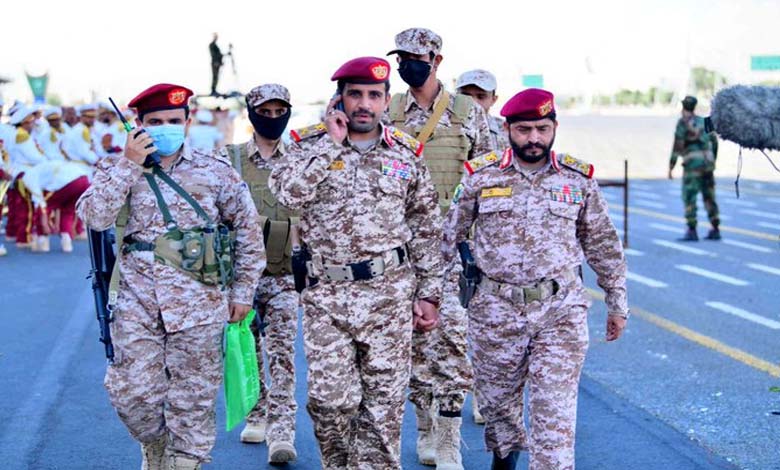Houthi Leader Mohammed al-Ghamari: The Military Mastermind Targeted by Israeli Airstrike

In a surprising twist in the complex regional conflict, Israeli media reported that an Israeli airstrike struck the Yemeni capital, Sanaa, on Saturday evening, targeting prominent Houthi commander Mohammed Abdulkarim al-Ghamari — one of the most influential figures in the Houthi military hierarchy, often referred to as the “military shadow” of group leader Abdul-Malik al-Houthi.
-
American Airstrikes on Houthis Expose the Double Standard of Yemen’s Muslim Brotherhood
-
The Muslim Brotherhood and the Houthis… Playing Openly After “Under-the-Table” Alliances
Officially serving as the Chief of Staff of the Houthi armed forces, al-Ghamari is not widely known in the media. However, within regional and international intelligence circles, he is recognized as one of the key masterminds behind the group’s military operations in Yemen, as well as some cross-border attacks against regional and international interests.
Who is Mohammed al-Ghamari?
Al-Ghamari hails from the remote village of Dha’an in the Washha district of Hajjah governorate in northwestern Yemen. While his exact date of birth is unknown, he is believed to have joined the Houthis during the six wars between the group and the Yemeni government from 2004 to 2010. He rose to prominence during the second and third wars and was captured in 2008 by government forces. He was later released in a prisoner exchange and returned to the battlefield with a more organized role.
-
Houthis Call on the Muslim Brotherhood Regarding Syria
-
Houthis Launch Ideological and Military Recruitment Campaign for Students Amid Public Outrage
Rise Within the Movement
Throughout the 2010s, al-Ghamari steadily climbed the ranks of the group. More than just a fighter, he showed strong ideological commitment to the group’s Iran-aligned religious doctrine. He attended ideological and theological courses at a special institute in Saada supervised by the group’s founder, Hussein Badreddine al-Houthi.
He later received military training in the southern suburbs of Beirut under Hezbollah’s supervision, followed by specialized military and security courses organized by Iran’s Islamic Revolutionary Guard Corps (IRGC). This phase played a crucial role in shaping his strategic mindset and made him a key planner of Houthi field operations.
-
Houthis Threaten Israel amid Stalled Second Round of Truce Negotiations
-
A New Agreement between the Brotherhood and the Houthis… Details
Military and Security Roles
Since 2016, al-Ghamari has headed the Houthis’ General Staff, overseeing war operations and strategic planning. He previously held military posts in the governorates of al-Hodeidah and Hajjah and served in security roles in Sanaa.
He had a direct role in leading the 2014 Houthi takeover of Sanaa, which ousted the internationally recognized government and consolidated the group’s control over the capital. Reports also indicate that he orchestrated several major offensives, particularly on Marib — a strategically vital and resource-rich region.
-
Houthis Torture a Young Man to Death for Refusing to Join Their Training… Details
-
The Houthis Attempt to Seize Residents’ Lands in Taiz and Turn Them into Mobilization Camps
In 2016, al-Ghamari was placed on a wanted list of 40 senior Houthi figures by the Saudi-led coalition, with a $10 million bounty for information leading to his capture. In 2021, he was sanctioned by the UN Security Council for his involvement in activities deemed threatening to Yemen’s and the region’s stability.
UN reports say he played a central role in coordinating attacks against civilians and in operations targeting Saudi Arabia.
-
Signs of Major Disputes between the Muslim Brotherhood and the Houthis… Details
-
Trump Reinstates the Houthis on the Terrorist Organization List
Uncertainty Surrounds His Fate
So far, the Houthis have not confirmed whether al-Ghamari was killed in the reported Israeli airstrike. No official statement has been issued, and similar rumors about his death have circulated in the past — only for him to later appear publicly, adding to his enigmatic persona.
Nevertheless, whether he was injured or not, the very act of targeting him signals a significant shift in regional responses to the Houthi threat, especially amid growing tensions in the Red Sea and the group’s escalating attacks on shipping routes and infrastructure.












